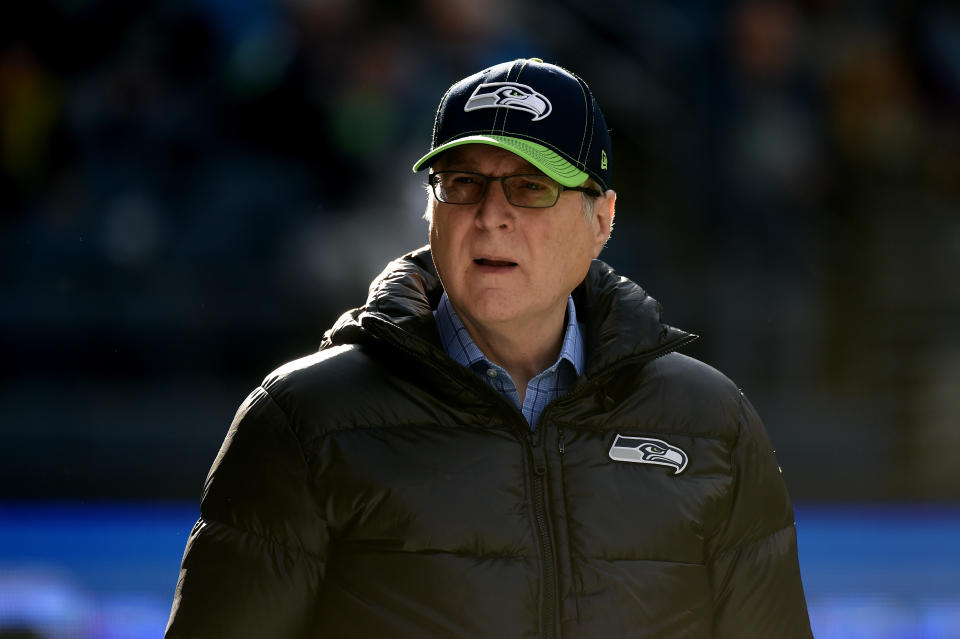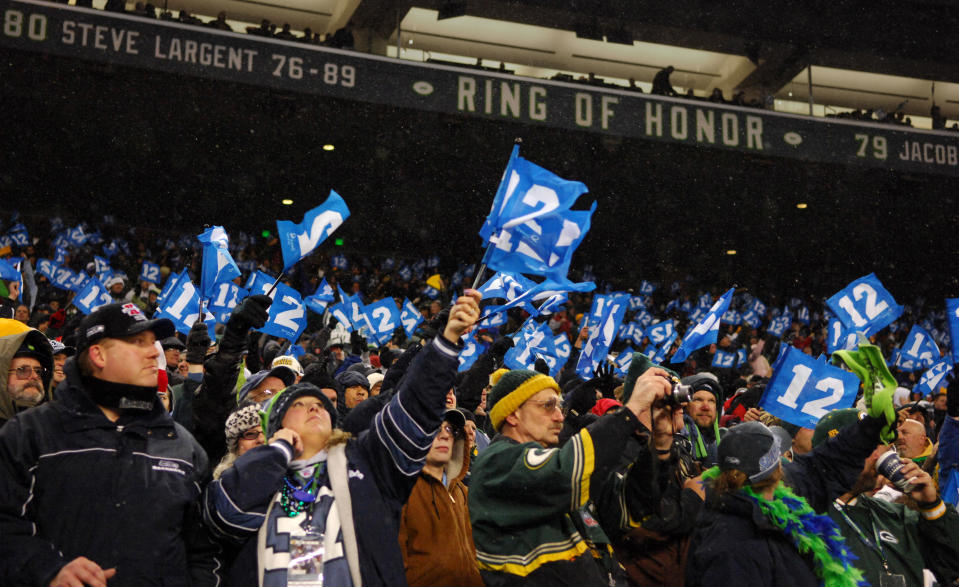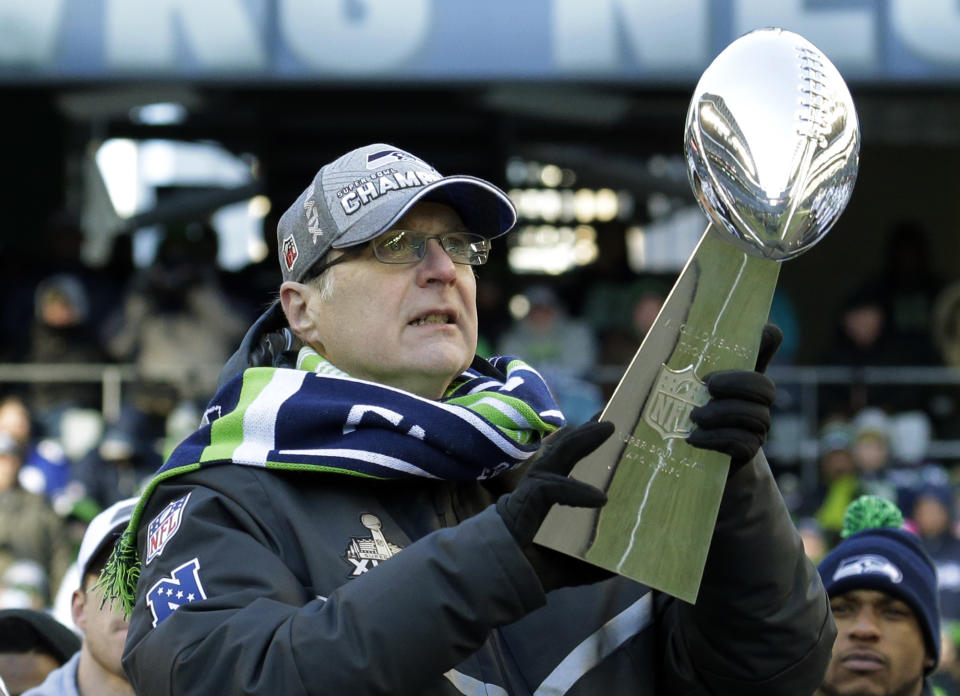Seahawks, Trail Blazers owner, Microsoft co-founder Paul Allen has died
Paul Allen, a co-founder of Microsoft and owner of the NFL’s Seattle Seahawks and NBA’s Portland Trail Blazers, has died at 65 from complications of non-Hodgkin lymphoma.
His family made the announcement in a statement Monday through his sister Jody Allen.
“My brother was a remarkable individual on every level. While most knew Paul Allen as a technologist and philanthropist, for us he was a much loved brother and uncle, and an exceptional friend.
Paul’s family and friends were blessed to experience his wit, warmth, his generosity and deep concern. For all the demands on his schedule, there was always time for family and friends. At this time of loss and grief for us – and so many others – we are profoundly grateful for the care and concern he demonstrated every day.”
Allen’s second bout with cancer
Allen announced on Oct. 1 that the cancer he had defeated in 2009 had returned.
“I’ve begun treatment & my doctors are optimistic that I will see a good result,” Allen posted on Twitter. “Appreciate the support I’ve received & count on it as I fight this challenge.”

Microsoft responds to Allen’s death
Microsoft CEO Satya Nadella released a statement shortly after the news of his death.
Paul Allen’s contributions to our company, our industry and to our community are indispensable. As co-founder of Microsoft, in his own quest and persistent way, he created magical products, experiences and institutions, and in doing so, he changed the world. I have learned so much from him – his inquisitiveness, curiosity and push for high standards is something that will continue to inspire me and all of us at Microsoft. Our hearts are with Paul’s family and loved ones. Rest in peace.
Allen co-founded Microsoft alongside Bill Gates in 1975 in Albuquerque, New Mexico. He left the company in 1983 after his initial cancer diagnosis and a deteriorating relationship with Gates but remained a significant shareholder, which led to his vast wealth.
He used part of his fortune to purchase the Trail Blazers in 1988 and the Seahawks in 1997.
Allen’s wealth, philanthropy
Listed by Forbes as the world’s 21st wealthiest man worth $21.3 billion, Allen never married or had children. He donated more than $2 billion during his lifetime, according to Forbes, and announced in 2010 that intended to leave the bulk of his fortune to charity upon his death.
Sports Business Radio reports that Jody has no interest in ownership of the Seahawks and Blazers and anticipates that the teams will be put up for sale by Allen’s estate.

Allen saved Seahawks in Seattle
Allen is credited for saving the Seahawks in Seattle when he took over the team in 1996. In February of that year, then-owner Ken Behring announced plans to move the franchise to Anaheim, California. The club had mostly floundered since being founded in 1976 and had just finished a sixth consecutive losing season.
King County sued and forced a temporary block of the move while seeking potential new ownership. Allen, a Seattle native and already the owner of the Blazers was the best and only option, according to Fox 13. He agreed to purchase the team for $200 million.
“Sports really brings a community together,” Allen wrote in his memoir of the purchase. “Given my long history with this community, I felt it would be a great thing to keep the team in Seattle.”
Allen sponsored a referendum to use public funds to partially finance a new stadium that narrowly passed in 1997, leading to the demolition of the Kingdome and construction of Century Link field, which opened in 2002.

Winning followed Allen in Seattle
The move marked a culture change for the team and the fanbase, and the wins followed shortly after. The Seahawks went on to their first Super Bowl appearance after the 2005 season and won their first Super Bowl after the 2013 season anchored by the iconic Legion of Boom defense.
NFL commissioner Roger Goodell released a statement on Allen’s death.
“Paul Allen was the driving force behind keeping the NFL in the Pacific Northwest. His vision led to the construction of CenturyLink Field and the building of a team that played in three Super Bowls, winning the championship in Super Bowl XLVIII. The raising of the “12th Man” flag at the start of every Seahawks home game was Paul’s tribute to the extraordinary fan base in the Seattle community.”
Allen’s Trail Blazers ownership
Allen purchased the Blazers in 1988 from real estate developer Larry Weinberg for $70 million. The Blazers made the playoffs in 23 of the 30 seasons under Allen’s ownership, including making the NBA Finals in 1990 and 1992.
Forbes placed the 2018 value of the team at $1.3 billion.
NBA commissioner Adam Silver released a statement on Allen’s death
“Paul Allen was the ultimate trail blazer — in business philanthropy and in sports. AS one of the longest-tenured owners in the NBA, Paul brought a sense of discovery and vision to every league matter large and small … He was a value voice who challenged assumptions and conventional wisdom and one that we will deeply miss as we start a new season without him. Our condolences to to his family, friends and the entire Trail Blazers organization.”
Allen was also a minority owner of Major League Soccer’s Seattle Sounders.
More from Yahoo Sports:
• Boston fans douse Chiefs star in beer after TD
• After loss, all Raiders star wants is to ‘make babies’
• Fan shouts ‘Vote Republican’ during anthem at NFL game
• Chiefs star blames NFL rule for Brady’s clutch TD run

 Yahoo Sports
Yahoo Sports 